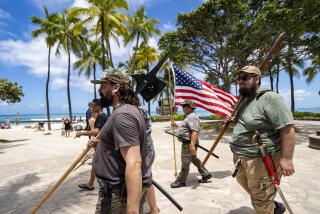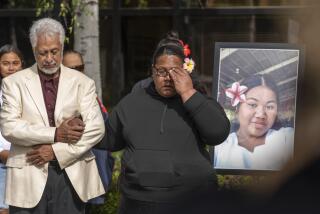Stop -- or We’ll Shout
- Share via
HOOPER BAY, Alaska — This Eskimo village sits on the edge of the continent, part shantytown, part suburb, part Wild West. One can’t go farther west without stepping into the Bering Sea -- and just beyond, onto the frosty eastern tip of Siberia.
No roads lead to Hooper Bay, which is why the modern world has taken its time coming here, and then only in spots. Clusters of plywood shacks stand a short distance from subdivisions of lookalike modular homes. There’s no running water, but lots of VCRs and satellite dishes, and computers hooked up to the Internet.
One of the more curious aspects of life here has to do with firearms. Every household has an assortment of rifles and shotguns. When people are hungry, they go out and shoot something, like a walrus in the surf.
Every adult has legal access to guns -- except the police.
The elders won’t allow it.
The policy -- some would call it an edict -- isn’t written anywhere in the town’s municipal code. It has simply been spoken by the gray-haired men and women with faces like carved driftwood who believe that armed officers would only create more trouble.
Hooper Bay is the only known municipality in the United States that prohibits officers from carrying firearms. Police Chief James Hoelscher wants to change that. For the past two years, the chief, half-Eskimo, has tried to convince leaders that a growing town of 1,200 needs a modern police department.
“It’s been like pedaling backwards going uphill,” says Hoelscher, 28. He has a deep voice and friendly dark eyes that can turn intimidating in an instant. “They [town leaders] think we’re still in the days of dog sleds and harpoons.”
The debate ebbs and flows in town meetings and wherever else it happens to come up, like the lobby of the post office or the checkout line at the grocery store. It is a passionate, disjointed conflict that signals the larger phenomenon of a traditional people facing the pressures of the modern world, the old confronted by the new.
The two sides are divided according to how they view their community. Those in favor of arming the nine police officers tend to see Hooper Bay as an American town; those against view it as an Eskimo village.
“There are many ways to deal with dangerous situations,” says City Administrator Raphael Murran. “If the police had guns, somebody might get shot. Somebody might get killed. Then there would be real trouble.”
Hoelscher says the village has already become a more dangerous place.
“We’re at a point, with the population, when bad things start to happen,” Hoelscher says. “I don’t really want to die to prove the point.”
*
Hooper Bay has been able to hold on to many of its old ways because of its remoteness. The nearest large city, Anchorage, is more than 500 miles away. The town lies on a massive knob of land called the Yukon-Kuskokwim Delta, where Alaska’s two largest rivers run into the Bering Sea.
From the air, the surface of the delta, which is roughly the size of Utah, looks like a lime-green sponge: flat, endless, grass-covered tundra pockmarked by hundreds of thousands of ponds, lakes and streams.
It is the Alaskan bush at its most remote, and to outsiders, its most inhospitable. Temperatures range from minus 80 degrees in the winter to a humid, mosquito-infested 80 in the summer.
Hooper Bay is the largest of about 50 Eskimo villages in the delta. The only way to get here is by bush plane or boat, and during the winters, by snowmobile, when the delta becomes an ice field.
The town was incorporated in 1965, the same year it got electricity. A sewer system is scheduled to be finished by the end of the decade, if funding comes through.
Local people are drawn to Hooper Bay by jobs and families, and the population has grown by about 50 a year in recent times, Hoelscher says.
More than 40% of residents live below the poverty level, and hundreds receive public assistance. Most of those not employed in government or construction get by on fishing, hunting and gathering.
About 98% of residents are Yupik Eskimo, and many share family lineages. Hoelscher says he is related, by blood or marriage, to one-third of the village. He has had the displeasure of arresting several relatives, including first cousins.
Alcohol is the bane of his department. Hooper Bay, legally, has been dry since 1983. An underground economy has thrived ever since, with bootleggers making home brew and smuggling in a steady supply from the outside.
In a typical year, the department will handle about 40 gun-related incidents, and dozens more involving other weapons. The majority of those incidents involve suspects who are drunk or high.
Hoelscher recalls an incident that happened July 14. A local man beat his girlfriend, who went to the police. Before officers could respond, the man, inebriated, called the department on a VHF radio. He knew the officers, and they knew him. He was 21 and a convicted felon. He barricaded himself in his house and said he would shoot anyone who came near. He dared officers to come get him.
The officers stayed put. They now cite the incident as an example of the inability to do their jobs because of a simple lack of weaponry. “Like a bear with no teeth,” as one resident described the department. Had the officers been armed, they would have had more options, including, but not necessarily, confronting the man. Or so the argument goes.
Town leaders, however, use the rest of the story to support their view. The morning after the incident, officers went to the man’s house and arrested him in his sleep. The officers found four loaded rifles and shotguns on the floor around his bed. What could have been a deadly confrontation, town leaders point out, ended peacefully.
Officer Dan Decker says that in his five years as an officer, he has been shot at four times, once when a man went on a shooting rampage in the middle of town. The man even shot at the police building. Officers ran, hid for cover and waited until an armed state trooper arrived to arrest the gunman.
The nearest troopers are based in Bethel, more than 150 miles southeast. It takes at least two hours by plane for troopers to arrive in Hooper Bay. With fog, it could take days.
“We’ve responded to calls in the villages where there are 20 long rifles in the house,” says Sgt. Perry Barr, the trooper who flew here the day of the rampage.
In its 45-year history as a state, Alaska has had 42 officers killed in the line of duty, many of them in the bush, most by gunshot.
“Everyone out there has guns. It’s odd to me that they won’t let the officers have them,” Barr says. “I tell you this: I don’t ever want to go on a call where an officer has been killed because he couldn’t protect himself.”
*
In a ramshackle house on the edge of town, elder Joe Bell, sitting like a smiling brown statue in a flannel shirt, explains the town’s refusal to arm their officers: “The elders say ‘no,’ ” Bell says. No further explanation is offered or deemed necessary. An elected council administers city business, but when it comes to the most important issues, the elders have the last say.
Generally, elders are people in their 60s and 70s, although the title refers more to people who’ve lived longer than everyone else around. Many elders don’t know their exact ages.
Like Bell, some elders speak a little English; many don’t. Or won’t. Some are old enough to recall the days when the Eskimos of the delta were nomadic.
Until the late 19th and early 20th centuries, the Native people lived in extended family groups that followed the fish and game during spring and summer, and returned to fixed encampments during winter.
Most of the communities became permanent villages within the past 50 to 100 years, as clans were forced by the government to settle in one place. The 1890 census found 138 people living in 14 sod houses in what is now Hooper Bay. Hooper was the last name of a naval captain who claimed a nearby island for the United States.
“These micro-urban environments are artificial creations, and the people are still trying to figure out how to live together in this situation,” says Darryl Wood, an associate professor at the University of Alaska’s Justice Center in Anchorage. Wood has done extensive studies on law enforcement problems in Native villages.
Wood says Hooper Bay is evolving from a loose-knit village to something closer to a modern American town, and that it is “very wise” of the community to carefully deliberate something as potentially divisive as armed police.
Traditional Eskimo communities had no equivalents to police officers, says anthropologist Mary Pete, a Yupik Native who lives in Bethel. Pete said conflicts and disagreements were settled within family clans, usually by the elders or by the most influential couple in the group.
Someone who committed a transgression, such as stealing food, would be subjected to rituals in which clan members would ridicule him in song. Humiliation was an effective punishment in a culture that regarded saving face as paramount, Pete says.
More serious transgressors could be ostracized. Life was a constant struggle on the delta; clan members depended on each other to survive. A person who was ostracized would be left on his own, which could mean death from any number of causes, such as starvation.
The concept of outsiders enforcing societal laws -- as when a state trooper flies into a village to make an arrest -- was viewed with suspicion, even resentment. This is reflected in the Yupik words for “police officer.” One word, tegufta, translates to “the person who takes you away.” Another word, qillerqista, means “the person who ties you up.”
Many Yupik Eskimos believe it’s bad enough to be forced to tolerate the occasional tegufta. Having armed officers in town, says teacher and lifelong resident Maryann Nukusuk, would be tantamount to “giving a gun to one family member and telling him to keep watch over other family members.”
“It’s too intimate, too interrelated here,” Nukusuk says.
If an officer were to shoot or kill someone, Nukusuk and other residents say, that officer could become a victim of another Eskimo custom: revenge killing by other family members. But what if an officer were killed? “It’s the job they chose,” she says.
Nukusuk acknowledges that violence happens in town, but she says the true Yupik way is to do everything possible to keep the peace, even if it means an unarmed police officer negotiating for “hours and hours and hours” to defuse a confrontation.
Back at his house, elder Bell concedes that times are changing, and that the delta is changing along with them. Just last spring, on May 31, three teenagers went on a four-hour shooting spree in the tiny Eskimo village of Stebbins, about 180 miles northeast of here, which by delta standards qualifies as next door.
Hooper Bay was abuzz for days with the news. Comments were made to the effect that the outside world was on the town’s doorstep.
Bell, reflecting on the incident for a few moments, says Chief Hoelscher will probably get his way, and that the town will most likely have armed police.
“Someday,” Bell says, smiling. “When all the elders are gone.”
More to Read
Sign up for Essential California
The most important California stories and recommendations in your inbox every morning.
You may occasionally receive promotional content from the Los Angeles Times.










